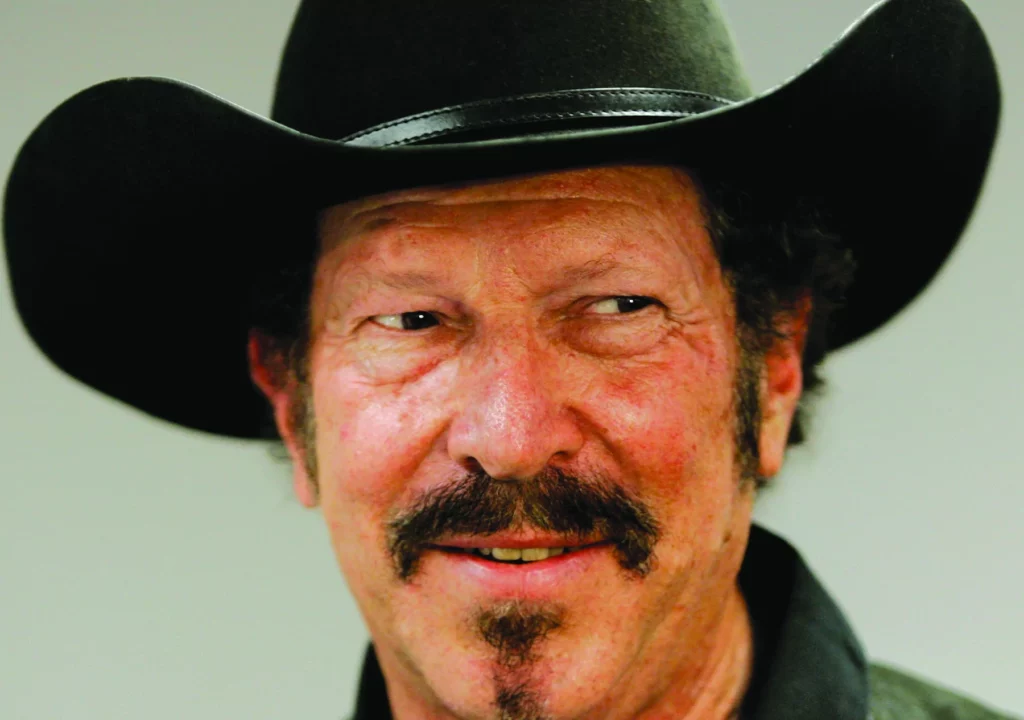
If someone were to put the populism of Donald Trump, the unreconstructed libertarianism of Ron Paul, the midlevel star power of Jesse Ventura, and the Texas twang of Ross Perot into a blender, Kinky Friedman might just have emerged.
The singer-songwriter, man of letters, adopted son of the Lone Star State, and sort of serious political contender died on June 27 at the age of 79.

Perplexed people looking for leading indicators of the present political moment could do worse than to take a long hard look at the 2006 Texas gubernatorial election. That year, incumbent Republican Gov. Rick Perry faced formidable challenges from not only Democratic contender Chris Bell but independent candidates Carole Keeton Strayhorn and the already world-famous Friedman.
Born in Chicago in 1944 to psychologist Thomas Friedman and his wife, Minnie, Richard Samet Friedman (as he was then known) likely had little conscious memory of his hometown: While he was a very small child, his parents, who were Jewish, pulled up stakes for the Texas Hill Country. There, they established a 266-acre camp for children called Echo Hill Ranch, which continues to operate to the present day. He spoke of his upbringing with sincere appreciation.
Perry managed to remain in residence at the Texas Governor’s Mansion, but Strayhorn and Friedman, between them, amassed 30.5% of the vote. And, in a larger, more profound way, the don’t-give-a-damn outsider politics of Friedman have utterly supplanted the play-it-safe insider politics of Perry and his ilk. Can anyone doubt that Friedman, had he somehow captured the governorship and felt compelled to make a quixotic White House run, would have fared better than the notoriously bad presidential aspirant Perry later did?
Long before he gave American electoral politics a welcome kick in the pants, Kinky Friedman had fashioned a career out of giving American pieties and platitudes a fulsome ribbing. In his capacity as a cheeky, intentionally offensive country-rock singer-songwriter, Friedman sent up both his times and his chosen genre.
“I was bar mitzvahed in Houston and went to Hebrew school,” Friedman said in a 2012 interview with journalist Simon Marks. “I was raised as a Jew in Texas, even though people on the East Coast don’t think that’s possible.” He added, “It’s a good thing to grow up in a minority. … It also makes a good artist or author to be on the outside looking in.”
Friedman did stints at the University of Texas, from which he received a bachelor’s degree in 1966, and in the Peace Corps. Then he found an artistic outlet for his naturally acerbic personality: country music that was sometimes poetic, frequently profane, and surprisingly popular. In his heyday in the 1970s, Friedman brought his ingratiating manner, Western garb, and appealing voice to tunes with titles like “Arsehole from El Paso” and “Get Your Biscuits in the Oven and Your Buns in the Bed,” the latter of which included lines undoubtedly conceived with the sole intention of inciting vitriol from feminists: “Before you make your weekly visit to the shrink/ You’d better occupy the kitchen/ Liberate the sink.”
This sort of thing might be expected to have a short half-life, and by the 1980s, Friedman had begun the process of diversifying his repertoire. He became an unlikely specialist in quasi-comic, semi-autobiographical mystery novels, including Greenwich Killing Time (1986), Elvis, Jesus and Coca-Cola (1993), and Armadillos and Old Lace (1994), and his views on modern life were given unfiltered expression in a column for Texas Monthly. As much as Fran Lebowitz, Friedman became less known for any single work of art, literary or otherwise, than for incarnating a certain disaffected comic persona.
It was this attitude of cynical comic candor that Friedman brought to his 2006 gubernatorial campaign, which melded actual policy notions (an inimitably Texas-style stew that included legalizing marijuana and beefing up border security) with the more general aim of underscoring, through his presence, the weaknesses of the politicians around him. During a debate with his fellow candidates, Friedman defined “politics” this way: “‘Poli’ means more than one [and] ‘ticks’ are blood-sucking parasites,” he said. And, defending his outre language in past public utterances, he said, “If you ain’t offending somebody, you ain’t getting anything done.” That Perry’s rejoinder to Friedman, something about how “words matter,” sounds so lame is a sign of how Friedman-style bluntness has become the coin of the realm.
CLICK HERE TO READ MORE FROM THE WASHINGTON EXAMINER
Yet his pugnaciousness and political incorrectness should not constitute his entire legacy: Entirely unfaked was his devotion to maintaining his parents’ camp, which focused on serving children of military personnel who had lost their lives, and to his dogs, one of whom he named Winston Randolph Spencer Churchill Friedman. (Entirely unfaked, too, was his admiration, frequently repeated, for the greatest of all British prime ministers.)
In 2015, when he was promoting his new album, The Loneliest Man I Ever Met, I had the fun fortune of interviewing Friedman by phone. His politics were, as ever, ecumenical. “I wouldn’t mind voting for, of the group, Ben Carson, Trump, and Bernie Sanders,” he told me back then. “You’ve got three men who I know are not corrupt.” Other than that, though, he was not optimistic. “They’re the Crips and the Bloods, the Republicans and Democrats,” he said. “And I like my idea of limiting all elected officials to two terms: one in office and one in prison.”
Peter Tonguette is a contributing writer to the Washington Examiner magazine.





